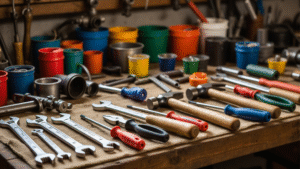Businesses
Hand tools are essential in many industries, from construction and automotive repair to manufacturing and maintenance. Having the right hand tools types for your projects can significantly improve your efficiency, ensure safety, and enhance the quality of your work. In this guide, we’ll walk you through the most common hand tools used in business settings and share how they can help you get the job done right.
What Are Hand Tools?
Hand tools are tools that are operated manually without the need for electricity or batteries. These tools are indispensable in industries like construction, automotive, and manufacturing, where precision, control, and craftsmanship are key. From everyday tasks like assembling furniture to heavy-duty construction projects, the right hand tools types can make a big difference.
Essential Hand Tools Types and Their Business Applications
Hammer
A hammer is one of the most basic and widely used hand tools in any workshop. It helps you apply force to objects, whether you’re driving nails, breaking materials apart, or shaping metal.
Types:
- Claw Hammer: Commonly used for driving and pulling nails, this is a go-to tool in construction and woodworking.
- Sledgehammer: Larger and heavier, this hammer is ideal for demolition work and driving larger stakes.
- Ball-Peen Hammer: Perfect for metalworking and shaping metal, it’s essential in fabrication and engineering tasks.
Uses: From construction and woodworking to metalworking and automotive repairs, hammers are versatile tools that every business should have on hand.
Screwdriver
A screwdriver is essential for turning screws, making it a must-have tool for assembly, repairs, and installations.
Types:
- Flathead Screwdriver: A simple yet effective tool for slotted screws.
- Phillips Screwdriver: Designed for crosshead screws, this tool is used in most assembly and repair jobs.
Uses: Whether you’re assembling machinery, repairing electronics, or fixing everyday household items, a screwdriver is indispensable in any toolbox.
Pliers
Pliers are used for gripping, bending, and cutting. Their versatility makes them crucial for a wide range of tasks, from electrical work to plumbing.
Types:
- Needle-Nose Pliers: Perfect for reaching tight spaces, they’re commonly used in electrical and small-scale work.
- Locking Pliers: Used when a strong, firm grip is needed, ideal for plumbing and automotive repairs.
- Cutting Pliers: These are designed for cutting wires and small materials, often used in electrical or mechanical work.
Uses: Pliers are widely used in electrical repairs, plumbing, and assembly. They’re essential for anyone handling delicate or heavy-duty materials.
Wrench (Spanner)
A wrench or spanner is used to tighten or loosen bolts, nuts, and fasteners. It’s an essential hand tool for automotive repairs, plumbing, and machinery maintenance.
Types:
- Adjustable Spanner: A versatile tool that can fit a range of bolt sizes.
- Combination Wrench: One side is an open-end, while the other is a box-end, allowing flexibility for different tasks.
- Socket Wrench: Comes with a set of interchangeable sockets, great for automotive and mechanical repairs.
Uses: Wrenches are indispensable in automotive repair, machinery maintenance, and plumbing work, making them a key tool for any business focused on mechanical services.
Tape Measure
A tape measure is a flexible and retractable measuring tool used to ensure accurate dimensions in any project.
Uses: Whether you’re constructing buildings, crafting furniture, or setting up equipment, a tape measure is a must-have for precision in your work.
Utility Knife
A utility knife is a compact tool designed for cutting through materials like cardboard, plastic, and drywall.
Uses: Utility knives are used for general cutting tasks in construction, packaging, and maintenance projects.
Hand Saw
A hand saw is used for cutting wood and other materials. It’s a straightforward tool, but essential for precision cutting in carpentry and DIY tasks.
Types:
- Crosscut Saw: Ideal for cutting across the wood grain.
- Rip Saw: Used for cutting along the grain of wood
Uses: Hand saws are a must in carpentry, woodworking, and general construction.
Chisel
A chisel is used for carving or shaping materials, such as wood, stone, or metal.
Types:
- Wood Chisels: Used for fine woodworking and furniture making.
- Cold Chisels: Used for cutting metal or stone.
Uses: Chisels are critical tools for sculpting, carpentry, and metalworking, making them a great addition to any workshop or construction site.
Allen Wrench (Hex Key)
An Allen wrench is used for tightening or loosening screws with hexagonal sockets. It’s a small tool but extremely important for assembly and maintenance tasks.
Uses: Common in furniture assembly, bicycle maintenance, and machinery repair, Allen wrenches are used widely in both personal and business settings.
Plumbing Tools
Plumbing tools are designed specifically for installing and maintaining plumbing systems. These tools ensure smooth and efficient work when it comes to pipes and fittings.
Types:
- Pipe Wrench: Used for gripping and turning pipes.
- Pipe Cutter: A specialized tool for cleanly cutting pipes.
- Plumber’s Tape: Used to seal pipe threads and prevent leaks.
Uses: Plumbing tools are essential for businesses in construction, repair, and maintenance that deal with water and sewage systems.
Automotive Tools
Automotive hand tools are specialized for vehicle repairs and maintenance. They ensure your cars, trucks, and machinery stay in top working condition.
Types:
- Ratchet Wrenches: These tools allow for quick tightening and loosening of bolts and nuts in automotive repairs.
- Socket Sets: Perfect for a wide range of automotive repairs, providing flexibility with multiple socket sizes.
Uses: Automotive tools are necessary for businesses focused on vehicle maintenance, repairs, and servicing.
Tool Apron
A tool apron is worn to keep your tools organized and easily accessible. This simple accessory can significantly improve your work efficiency.
Uses: Ideal for construction workers, carpenters, and mechanics, a tool apron allows you to carry your essential hand tools while keeping them organized and readily available.
How to Choose the Right Hand Tools for Your Business
Selecting the right hand tools for your business involves understanding the specific needs of your projects and workforce. Here are some tips to help you make the best decision:
- Know the Task: Different tasks require different tools. Make sure the hand tools types you choose are suitable for the job.
- Quality is Key: Invest in durable, high-quality tools made from materials like carbon steel or alloy for longevity and strength.
- Comfort: Choose tools with ergonomic handles to reduce strain during long hours of use. Non-slip grips also improve safety.
- Safety Features: Tools with insulated handles and safety guards are essential, particularly when working with electricity or dangerous materials.
- Trustworthy Hand Tools Supplier: Partnering with a reliable hand tools supplier ensures you get quality tools that will perform well in demanding business environments.
Conclusion
Whether you’re running a construction company, managing an automotive repair shop, or overseeing maintenance in a large facility, having the right hand tools types is essential for success. Investing in high-quality, durable tools from a trusted hand tools supplier can make a significant impact on your efficiency, safety, and overall work quality. Choose the right tools, and watch your business thrive.






